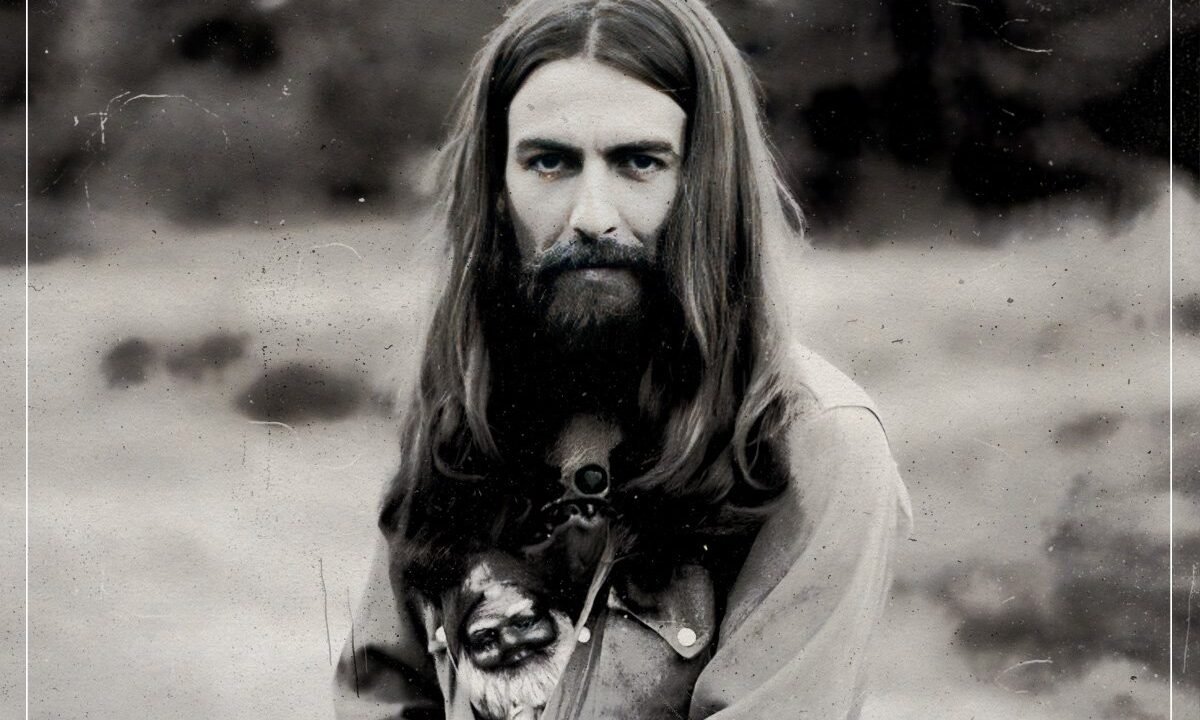

A rockstar George Harrison may well have been, but a swaggering fellow he most certainly was not. If anything, the legacy that the Beatles wove into place was one that dismantled the ‘ego’ of the musician. He was an iconoclast in the truest sense, so when he witnessed Oasis construct their own alter in the 1990s, he was more than a little miffed.
“He is like a bit out of date,“ he explained regarding Liam Gallagher to Independent Radio News when the Manchester band were first breaking onto the scene, “he’s just silly“. His criticism didn’t stop with the frontman either. He also thought that “they don’t have that much depth“ and simply are “not very interesting“.
In response, Liam Gallagher called him “a fucking nipple“. That sure showed George.

If George Harrison’s outlook was to dissolve the ego, then it is not without irony that Bono claims that ‘I Saw Her Standing There’ was the song that first gave him a “messianic complex“. He never stopped loving The Beatles thereafter, even when word of Harrison’s criticism reached him, he commented, “Well, he didn’t like U2 very much. But we loved him. We really did love him.“
So, at risk of stating the obvious, why wasn’t the feeling mutual? “Look at a group like U2. Bono and his band are so egocentric. The more you jump around, the bigger your hat is, the more people listen to your music,” Harrison explained in 1997. These comments to the Independent were further galvanised when he asked Le Figero, “Will anyone remember U2 in 30 years? I doubt it.“
If Harrison’s artistic pursuit could be seen as a search for meaning, then U2 still haven’t found what he was looking for.

As it happens, John Lennon and Paul McCartney were actually firmly on board with punk, but Harrison was a little less favourable when it came to his thoughts on the movement’s main engine. He told Rolling Stone in 1979: “As far as musicianship goes, the punk bands were just rubbish – no finesse in the drumming, just a lot of noise and nothing”. That was pretty much the point of punk, in fairness to the Pistols.
He continued to showcase how he may well have missed the mark on this one when he added, “I felt very sorry when the Sex Pistols were on television, and one of them was saying, ‘We’re educated to go into the factories and work on assembly lines’, and that’s their future. It is awful, and it’s especially awful that it should come out of England because England is continually going through depression; it’s a very negative country. Everybody wants everything, and nobody wants to do anything for it.”
The multi-millionaire added, ”It’s a very simple thing; how do you give people money if there is none? The only way you make more money is to work harder.” Before concluding, ”You don’t fight negativity with negativity. You have to overpower hatred with love, not more hatred”. The punks would argue that the 1960s tried that, and what good did it do in the ’70s?

George Harrison helped to kickstart a rather unhealthy Indomania. The boon of his sitar obsession was that the world suddenly became open to other cultures in a non-colonial way, but the dark side of Orientalism and other factors came along with that benefit. As Neil Young explained to The Observer Music Monthly regarding his encounters with Charles Manson and how he seemed to exploit this expansion, ”It was the ugly side of the Maharishi. You know, there’s one side of the light, nice flowers and white robes and everything, and then there’s something that looks a lot like it but just isn’t it at all.”
While, of course, that’s an extreme example, Harrison also vented his spleen when it came to people who purported to embody the right side of the movement but failed to live up to it in reality. This led him to scold The Who’s guitarist, Pete Townshend, as ”fake”.
Ironically speaking to India Today of all publications, he said, “Townsend! Yeah! Every time I’ve seen that guy he’s been so stoned and talking such a lot of nonsense that I don’t think he means any of the religious stuff he spouts.” Casting doubt on the sincerity of spiritual allegories like Tommy.

While Elton John might have been good buddies with John Lennon, helping to write the bespectacled Beatle’s first-ever number one, the so-called Quiet One was far less kind when it came to his music. Once again, speaking to India Today, he commented, “Well, Elton John’s music is something I’ve never thought much of.”
He cuttingly continued, “It all sounds the same, though I think he’s written a good song once; many years ago, of course. His music is made to a formula: throw in lyrics, throw in four chords, shake well, and there it is, the new Elton John super-hit!” At the time, in 1976, Harrison was moving further away from conventions, distancing himself from the towering shadow of The Beatles’ commercial success.
All the same, at least he wasn’t as scathing as Keith Richards, who called poor Elton “an old bitch“ and said that his “writing is limited to songs about dead blondes.”

During a session in 1992, Bob Geldof casually asked George Harrison what he thought of Neil Young’s work. The answer was more cutting than he had bargained for. “I’m not a Neil Young fan,” he replied. Geldof then tried to bring about some parity by crediting his guitar work. Once again, Harrison cut him down. “I hate it,“ he interrupted, “I can’t stand it”.
In fact, it was his angular guitar playing that drew the most poison from the former Beatle, and Harrison had experienced it first-hand, too. “It’s good for a laugh. We did this show with him, I saw it from the other side of the stage and looked around. I looked at Eric and said, ‘What’s going on?’ He did the solo in the middle then he kind of looked at me like – ‘don’t look at me, it’s not me’,” he recalled.
In Young’s defence, it was the very same playing that brought grunge to fruition, so perhaps he was playing for different ears than those raised listening to the blues.

In the 1960s, there was a sense that George Harrison was trying to escape the box that the press had built for him, and The Hollies certainly offered him an opportunity to take a sledgehammer to the notion of him being meek and mild. The Hollies covered Harrison’s Beatles composition ‘If I Needed Someone’ in 1965. Needless to say, he didn’t like it.
Speaking to the NME amid a hectic December, Alan Smith recalled his abrasive encounter, writing: “George was getting ready for the first house performance, and I asked him about songwriting. ‘I see you’ve written one for The Hollies.’ George turned sharply away from the mirror. ‘Tell people that I didn’t write it for The Hollies,’ he said bluntly.”
He continued: “It’s called ‘If I Needed Someone’, and they’ve done it as their new single, but their version is not my kind of music. I think it’s rubbish the way they’ve done it! They’ve spoilt it. The Hollies are all right musically, but the way they do their records, they sound like session men who’ve just got together in a studio without ever seeing each other before. Technically good, yes. But that’s all.’”

They certainly had their battles in The Beatles, but they were all part of the brotherly magic that made them so good. That might have carried over into the solo years when George Harrison asked his fans to attack Paul McCartney‘s car, but that was a noted regret. Yet, there were no qualms or retractions when it came to the questions he had over some of Macca’s solo work.
Speaking to Rolling Stones in 1979 about McCartney’s recent output, he commented, “I think it’s inoffensive. I’ve always preferred Paul’s good melodies to his screaming rock ‘n’ roll tunes. The tune I thought was sensational on the London Town album was ‘I’m Carrying’. But all the noisy, beaty things I’m not into at all. But then that’s not only with Paul’s music, that goes right across the board. I’m not a fan of that sort of punky, heavy, tinny stuff. I like a nice melody.”
A few years later, when he was asked about his old pal adding tracks like ‘Beautiful Boy’ to his setlist, Harrison jabbed, ”Maybe [it’s] because he ran out of good ones of his own”.

On a fateful day in Beatles history, the Fab Four were trying to lay low and cool off in California when some LSD came their way via David Crosby. Paul McCartney abstained, but the others dropped a tab of acid and floated around in a swimming pool. They decided to take the edge off by watching a movie. It turned out to be a mistake.
“The movie was put on, and — of all things — it was a drive-in print of Cat Ballou,” Harrison said in The Beatles Anthology. “The drive-in print has the audience response already dubbed onto it, because you’re all sitting in your cars and don’t hear everybody laugh. Instead, they tell you when to laugh and when not to. It was bizarre, watching this on acid. I’ve always hated Lee Marvin, and listening on acid to that other little dwarf bloke with a bowler hat on, I thought it was the biggest load of baloney shite I’d ever seen in my life.”
Harrison already had problems with Lee Marvin when it came to his acting, but he would haunt the legacy of The Beatles in a much more ominous way later down the line. By rights, the group’s final single, ‘Let It Be’, should’ve been a smash-hit send-off, but sadly, it only peaked at number two in the UK charts. It was kept off the top spot by none other than Marvin and his dastardly single, ‘Wanderin’ Star’.

The old adage ‘never meet your heroes’ is a cliche for a reason. While the Fab Four might have grown up listening to Elvis Presley, their destiny was to transcend him. Meanwhile, the King grew so embittered with act that dethroned him that he actively contacted President Nixon and offered his services as a spy in a bid to deport them.
So, while Elvis might have changed Harrison’s life, it all ended in disappointment for both parties. “I met him in Madison Square Garden a couple of years before the end. It was a bit sad really because he had all those squawking singers and trumpet players and that stuff,“ Harrison recalled during a roundtable with Paul and Ringo. ”I just wanted to say to him ‘just get your jeans on and get your guitar and do [sings] ‘that’s alright with me mama’ and bugger all that other crap.”
Harrison did offer the caveat that it was likely fan pressure that pushed Elvis towards a stilted routine, but ultimately questioned the depth behind the King, questioning the substance of his back catalogue, and commenting, “Have you ever heard such a dumb line? — ‘Love is a thing that we never can share.’”









